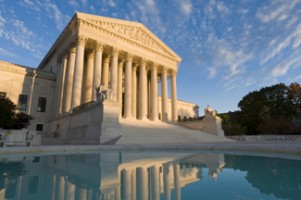Weekly Briefs: SCOTUS will hear tribal, wetlands cases; a victory for University of Florida profs in free speech case

Image from Shutterstock.
SCOTUS will consider reach of McGirt
The U.S. Supreme Court will consider the reach of its 2020 decision McGirt v. Oklahoma, which held that a large part of eastern central Oklahoma is an American Indian reservation. The decision meant that tribal members who commit crimes on the Creek Reservation can’t be prosecuted by the state of Oklahoma, although they can be prosecuted by the federal government for major crimes. Last Friday, the Supreme Court agreed to decide a different question: whether the state can prosecute non-Indians who commit crimes against Indians on reservations. The Supreme Court declined to consider whether the McGirt decision should be overturned, however. The case is Oklahoma v. Castro-Huerta. (The New York Times, the Washington Post, SCOTUSblog, the cert petition)
Supreme Court will hear wetlands case
The U.S. Supreme Court on Monday agreed to hear the case of Michael and Chantell Sackett, who want to build a home on their property near Priest Lake, Idaho. At issue is whether the land can be regulated as wetlands under the Clean Water Act, which would mean that a federal permit is required. The Sacketts are urging the high court to adopt a test requiring water on property to be connected to a lake or other waterway to be considered “waters of the United States” that can be regulated. The Biden administration said that test would curtail the federal government’s ability to protect wetlands. The case is Sackett v. U.S. Environmental Protection Agency. (Reuters, the Washington Post, SCOTUSblog, the cert petition)
Judge rules for University of Florida profs in free speech case
Chief U.S. District Judge Mark Walker of the Northern District of Florida ruled last Friday for professors at the University of Florida who challenged a policy that had barred them from giving testimony in a voting rights case. The Tallahassee, Florida, federal judge rejected claims that the lawsuit was moot because the university revised its policy and allowed the professors to testify. Walker said the revised policy still allowed the university to ban involvement in matters that conflict with state interests. Walker said the professors were likely to succeed on their First Amendment claim and granted an injunction. (The New York Times, the Washington Post, the Tallahassee Democrat, the Jan. 21 opinion)
Judge is back on bench after AR-15 plea deal
Judge Mark Thompson is back on the bench in Breckenridge, Colorado, after pleading guilty to a reduced charge in a case that had accused him of threatening his stepson with an “AR-15 style rifle.” Thompson pleaded guilty to disorderly conduct earlier this month. He was placed on probation and ordered to undergo anger management treatment. Thompson resigned as chief judge of the state’s 5th Judicial District in a Jan. 21 letter, but he will serve as a district judge hearing civil cases. (The Summit Daily News)
Spending on state high court races at record levels
Spending on state supreme court races hit record levels in the 2019-2020 election cycle, when adjusted for inflation, according to a report by the Brennan Center for Justice at the New York University School of Law. Thirty-eight states choose justices on their top court by elections. Big donors and interest groups spent nearly $100 million in those races. The report called the spending “less an aberration than an escalation.” (The Hill via How Appealing, the Brennan Center for Justice’s report and press release)
Jury awards $110M in earplugs defect trial
Federal jurors in Pensacola, Florida, awarded $110 million Thursday to two men who said they had hearing damage as a result of wearing combat earplugs made by the 3M Co. It’s the largest verdict yet in the federal mass tort litigation. 3M said it plans to appeal. (Reuters, Law.com)
Write a letter to the editor, share a story tip or update, or report an error.


